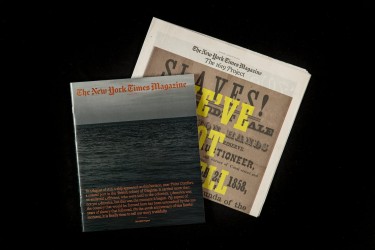Seldom these days does a paper edition have such blockbuster draw. New Yorkers not in the habit of seeking out their Sunday Times ventured to bodegas to nab a hard copy. (Today you can find a copy on eBay for around a hundred dollars.) Commentators, such as the Vox correspondent Jamil Smith, lauded the Project—which consisted of eleven essays, nine poems, eight works of short fiction, and dozens of photographs, all documenting the long-fingered reach of American slavery—as an unprecedented journalistic feat. Impassioned critics emerged at both ends of the political spectrum. On the right, a boorish resistance developed that would eventually include everything from the Trump Administration’s error-riddled 1776 Commission report to states’ panicked attempts to purge their school curricula of so-called critical race theory. On the other side, unsentimental leftists, such as the political scientist Adolph Reed, Jr., accused the series of disregarding the struggles of a multiracial working class. But accompanying the salient historical questions was an underlying problem of genre. Journalism is, by its nature, a provisional and fragmentary undertaking—a “first draft of history,” as the saying goes—proceeding in installments that journalists often describe humbly as “pieces.” What are the difficulties that greet a journalistic endeavor when it aspires to function as a more concerted kind of history, and not just any history but a remodelling of our fundamental national narrative?
In the preface to a new book version of the 1619 Project, Nikole Hannah-Jones, a Times Magazine reporter and the leading force behind the endeavor, recalls that it began, as many journalistic projects do, in the form of a “simple pitch.” She proposed a large-scale public history, harnessing all of the paper’s institutional might and gloss, that would “bring slavery and the contributions of Black Americans from the margins of the American story to the center, where they belong.” The word “project” was chosen to “emphasize that its work would be ongoing and would not culminate with any single publication,” the editors wrote. Indeed, the undertaking from the beginning was a cross-platform affair for the Times, with special sections of the newspaper, a series on its podcast “The Daily,” and educational materials developed in partnership with the Pulitzer Center. By academic standards, the proposed argument was not all that provocative. The year 1619 itself has long been depicted as a tragic watershed. Langston Hughes wrote of it, in a poem that serves as the new book’s epigraph, as “The great mistake / That Jamestown made / Long ago.” In 2012, the College of William & Mary launched the “Middle Passage Project 1619 Initiative,” which sponsored academic and public events in anticipation of the approaching quadricentennial. “So much of what later becomes definitively ‘American’ is established at Jamestown,” the organizers wrote. But the legacy-media muscle behind the 1619 Project would accomplish what its predecessors in poetry and academia did not, thrusting the date in question into the national lexicon. There was something coyly American about the effort—public knowledge inculcated by way of impeccable branding.













